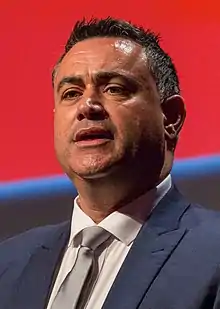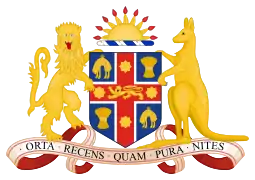National Party of Australia – NSW
The National Party of Australia – N.S.W.[lower-alpha 1] , commonly known as the NSW Nationals, is a political party in New South Wales which forms the state branch of the federal Nationals. Traditionally representing graziers, farmers and rural voters generally, it began as the Progressive Party, from the 1922 split until 1925. It then used the name the Country Party until 1977, when it became the National Country Party. The party's name was changed to the National Party of Australia in 1982.
National Party of Australia – N.S.W. | |
|---|---|
 | |
| Leader | John Barilaro |
| Deputy Leader | Paul Toole |
| Founded | 1919 |
| Youth wing | Young Nationals |
| Membership (2020) | 5,802[1] |
| Ideology | Conservatism Agrarianism[2] |
| Political position | Centre-right |
| Colours | Green and Yellow |
| Legislative Assembly | 12 / 93
|
| Legislative Council | 6 / 42
|
| House of Representatives | 7 / 46 (NSW seats)
|
| Senate | 2 / 12 (NSW seats)
|
| Website | |
| nswnationals.org.au | |

The party, commonly referred to as "The Nationals," has generally been the junior partner in a centre-right Coalition with the NSW branch of the Liberal Party of Australia. Since 1927, the Nationals have been in Coalition with the Liberals and their predecessors, the Nationalist Party of Australia (1927–1931), the United Australia Party (1931–1943), and the Democratic Party (1943–1945). New South Wales is the only state where the Coalition has never been broken, and yet has not merged into a unified non-Labor party.
During periods of conservative government, the leader of the Nationals also serves as Deputy Premier of New South Wales. When the conservatives are in opposition, the Liberal and National parties usually form a joint opposition bench. As a measure of the Coalition's solidity in NSW, the Liberals won enough seats to theoretically govern alone during the Coalition's massive landslide at the 2011 state election. However, new Premier Barry O'Farrell kept the Nationals in his government.
History
Name changes
- 13 October 1919 – The Farmers' and Settlers' Association of New South Wales, the NSW Graziers' Association and the People's Party of Soldiers and Citizens meet as the first electoral council of the Progressive Party of New South Wales.
- 15 December 1921 – Split of the Progressive Party between urban and rural wings. Rural wing (known as the "True Blues") continues as the Progressive Party.
- 12 August 1925 – Michael Bruxner announces to the NSW Legislative Assembly that the party has changed its name to the Country Party of New South Wales.
- 24 September 1931 – In order to clarify its support for the New England New State Movement, the party name changes to the United Country Party of New South Wales.
- 9 February 1944 – The State Conference agrees to a further name change as the Australian Country Party (N.S.W.).
- 26 June 1976 – The State Conference held in Broken Hill rejects a proposal to follow the federal party and rename itself as the "National Country Party of Australia – NSW".
- 26 June 1977 – The following State Conference held in Coffs Harbour approves the name change to the National Country Party of Australia – NSW.
- 26 June 1982 – The annual State Conference held in Wagga Wagga approves the name change to the National Party of Australia – NSW. The federal party does not make the same change until its Federal Conference on 16 October.
- 25 October 2003 – The NSW Central Council of the party approves the 11 October decision of the federal executive to use the term, The Nationals, in all state and federal election campaigns.[4]
Neo-Nazi infiltration
In 2018, the party revealed that approximately 30 members of its youth wing were being investigated for alleged links to neo-Nazism. Federal Nationals leader Michael McCormack denounced these attempts stating that: "The Nationals will not tolerate extremism or the politics of hate. People found to engage with such radicalism are not welcome in our party. We are a grassroots party proudly championing what matters most to our regional and rural communities – always has been, always will be". Several suspected neo-Nazis were expelled from the party and its youth wing. The leader of the NSW Nationals, John Barilaro, also denounced racism and fascism within the party stating that: "I have no problems calling this out, this is something I’m very strong on, I do not accept racism".[5]
2020 Attempt to move to the crossbench
On the 10th of September 2020, the Nationals NSW declared they will no longer support the legislation of the NSW Liberal Party, and are moving to the crossbenches in Parliament. This was caused due to a new planning proposal which looks to strengthen land clearing for agricultural activities which threatens endangered koala populations, for which they disagree with.[6] On the morning of the 11th the Nationals backed down and rejoined the government.[7]
Leaders of the New South Wales National Party
This is a list of the Leaders of the National Party of Australia in New South Wales.
| Party Leader | Start of Term | End of Term | Deputy Premier |
|---|---|---|---|
| Sir Michael Bruxner | 1921 | 1925 | |
| Ernest Buttenshaw | 1925 | 1932 | |
| Sir Michael Bruxner | 1932 | 1958 | 1932–1941 |
| Sir Davis Hughes | 1958 | 1959 | |
| Sir Charles Cutler | 1959 | 1975 | 1965–1975 |
| Leon Punch | 1975 | 1985 | 1975–1976 |
| Wal Murray | 1985 | 1993 | 1988–1993 |
| Ian Armstrong | 1993 | 1999 | 1993–1995 |
| George Souris | 1999 | 2003 | |
| Andrew Stoner | 2003 | 2014 | 2011–2014 |
| Troy Grant | 2014 | 2016 | 2014–2016 |
| John Barilaro | 2016 | incumbent | incumbent |
Deputy Leaders of the New South Wales National Party
| Deputy Leader | Start of Term | End of Term |
|---|---|---|
| William Fleming | 1922 | 1922 |
| Ernest Buttenshaw | 1922 | 1925 |
| William Missingham | 1925 | 1932 |
| David Drummond | 1932 | 1949 |
| Roy Vincent | 1950 | 1953 |
| Doug Dickson | 1953 | 1958 |
| Sir Charles Cutler | 1958 | 1959 |
| Bill Chaffey | 1959 | 1968 |
| Davis Hughes | 1968 | 1973 |
| Leon Punch | 1973 | 1975 |
| Tim Bruxner | 1975 | 1981 |
| Wal Murray | 1981 | 1984 |
| Ian Armstrong | 1984 | 1993 |
| George Souris | 1993 | 1999 |
| John Turner | 1999 | 2003 |
| Don Page | 2003 | 2007 |
| Andrew Fraser | 2007 | 2008 |
| Adrian Piccoli | 2008 | 2016 |
| Niall Blair | 2016 | 2019 |
| Paul Toole | 2019 | Incumbent |
State election results
| Election | Seats won | ± | Total votes | % | Position | Leader |
|---|---|---|---|---|---|---|
| 1927 | 13 / 90 |
100,963 | 8.89% | NP-CP Coalition government | Ernest Buttenshaw | |
| 1930 | 12 / 90 |
126,779 | 9.56% | Opposition | Ernest Buttenshaw | |
| 1932 | 23 / 90 |
175,862 | 13.16% | UAP-CP Coalition government | Michael Bruxner | |
| 1935 | 23 / 90 |
– | 162,178 | 12.92% | UAP-CP Coalition government | Michael Bruxner |
| 1938 | 22 / 90 |
164,045 | 13.86% | UAP-CP Coalition government | Michael Bruxner | |
| 1941 | 12 / 90 |
153,639 | 11.05% | Opposition | Michael Bruxner | |
| 1944 | 10 / 90 |
131,950 | 10.41% | Opposition | Michael Bruxner | |
| 1947 | 15 / 90 |
162,467 | 10.22% | Opposition | Michael Bruxner | |
| 1950 | 17 / 94 |
144,573 | 8.97% | Opposition | Michael Bruxner | |
| 1953 | 14 / 94 |
179,680 | 11.6% | Opposition | Michael Bruxner | |
| 1956 | 15 / 94 |
172,020 | 10.16% | Opposition | Michael Bruxner | |
| 1959 | 16 / 94 |
148,738 | 8.71% | Opposition | Charles Cutler | |
| 1962 | 14 / 94 |
180,640 | 9.37% | Opposition | Charles Cutler | |
| 1965 | 16 / 94 |
208,826 | 10.23% | LP-CP Coalition government | Charles Cutler | |
| 1968 | 17 / 94 |
229,656 | 10.62% | LP-CP Coalition government | Charles Cutler | |
| 1971 | 17 / 96 |
– | 193,509 | 8.65% | LP-CP Coalition government | Charles Cutler |
| 1973 | 18 / 99 |
261,504 | 10.48% | LP-CP Coalition government | Leon Punch | |
| 1976 | 18 / 99 |
– | 270,603 | 10.03% | Opposition | Leon Punch |
| 1978 | 17 / 99 |
276,984 | 9.90% | Opposition | Leon Punch | |
| 1981 | 14 / 99 |
314,841 | 11.21% | Opposition | Leon Punch | |
| 1984 | 15 / 99 |
266,095 | 8.85% | Opposition | Leon Punch | |
| 1988 | 20 / 109 |
440,482 | 13.74% | LP-NP Coalition government | Wal Murray | |
| 1991 | 17 / 99 |
324,214 | 10.52% | LP-NP Minority government | Wal Murray | |
| 1995 | 17 / 99 |
– | 378,878 | 11.10% | Opposition | Ian Armstrong |
| 1999 | 13 / 93 |
331,343 | 8.87% | Opposition | George Souris | |
| 2003 | 12 / 93 |
368,004 | 9.63% | Opposition | George Souris | |
| 2007 | 13 / 93 |
396,023 | 10.05% | Opposition | Andrew Stoner | |
| 2011 | 18 / 93 |
521,864 | 12.56% | LP-NP Coalition government | Andrew Stoner | |
| 2015 | 17 / 93 |
464,653 | 10.55% | LP-NP Coalition government | Troy Grant | |
| 2019 | 13 / 93 |
401,718 | 9.87% | LP-NP Coalition government | John Barilaro |
Notes
- The party name includes the periods in "N.S.W." according to the Australian Electoral Commission.[3]
References
- https://www.smh.com.au/national/nsw/shocked-quarter-of-nationals-members-quit-since-coming-to-power-20201002-p561jz.html
- "National Party Constitution" (PDF). Archived from the original (PDF) on 25 April 2013. Retrieved 19 March 2013.
- "Current register of political parties". Australian Electoral Commission. 22 March 2017.
- Davey, Paul (2006). The Nationals: The Progressive, Country, and National Party in New South Wales 1919–2006. Leichhardt: Federation Press. pp. 452–453.
- An abridged list of articles discussing neo-Nazi infiltration:
- "'These guys are crazy': Barnaby Joyce backs 'Nazi' expulsions after backtrack". The Guardian. The Guardian. Retrieved 4 November 2018.
- "Nationals clear man accused of leading alleged neo-Nazi branch stacking". The Guardian. The Guardian. Retrieved 4 November 2018.
- Hutchins, Gareth. "Far right extremists 'not welcome' in Nationals, leader says amid investigation". The Guardian`. the Guardian. Retrieved 4 November 2018.
- Michael, McGowen. "NSW Young Nationals expel and suspend members over far-right links". The Guardian. The Guardian. Retrieved 4 November 2018.
- "NSW Government in turmoil as 'betrayed' Nationals effectively leave Coalition over koala bill". www.abc.net.au. 10 September 2020. Retrieved 10 September 2020.
- Smith, Alexandra (11 September 2020). "NSW Nationals back down after Berejiklian's ultimatum". The Sydney Morning Herald. Retrieved 11 September 2020.
